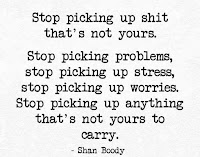In the past, I wrote various posts about Zen practice and enlightenment, but this is a good reminder in a year where we have all been seeking something, ANYTHING to help ease our suffering. This year has truly been a big challenge to stay focused and positive in the face of a deadly pandemic that is still far from over. It has touched all of our lives in some fundamental ways and we know in the back of our minds the world can never truly go back to what it was before.
This is a time for warriors. When life is easy it is easy to be brave. This is the time that will test us and help us discover new strength, new courage and new compassion as we are forced to remember how important it is to stay connected to each other. This is what we were trained for. Not every fight takes place on a battlefield or in a dark alley. This year has been tough and if you are still standing you deserve to reward yourself. You've earned it. Celebrate your victories, however small.
I understand the importance of workshops, seminars, retreats, sequesters and other special events in the spiritual calendar. These activities can increase our focus and get us prepared to experience a higher level of awakening. Often, they can help us prepare for the next step of our journey, rather like packing a suitcase of essentials. Events can shake us out of routine and give us new perspectives to consider alternative points of view and bring us insight. They are also great sources of fellowship and learning, especially when they involve mentors we don't get to see regularly. For me, the conversations in between the training sessions have been some of the most valuable and precious times of all.
That said, "going to the mountain" is no substitute for daily, scheduled practice. Muscle memory and spiritual memory too, comes from constant repetition. It is important to practice the techniques until they are effortless. It is just as important to practice the meditation until proper posture, breathing and clarity are automatic. Without this, the practice can never lead to the freedom we seek.
Unlike many other religions, our spiritual practice is a reminder that we have all that we need within us. Teachers and guides can help, but we own our own karmic journeys and our own paths to spiritual growth. "The Mountain" cannot give us anything we did not already have. This ownership is very important because it takes away the excuse of dependency on something external. The Mountain cannot take the place of skipped practices or lack of effort. It cannot replace the daily routine. There are no make-ups or do-overs.
THERE ARE NO SHORTCUTS.
This is very important because if you imagine there are, you seek them, get distracted and lose time. Once you accept there are not, you are free to put in the real work required to progress and grow. You also begin to fully appreciate the relationship between effort and outcome which is at the heart of good practice. You remind yourself that you can set goals and work at them until your achieve your results, not just in the dojo but throughout your life.
Forgiveness, gratitude, compassion, grace, understanding are all within our capability if we simply surrender to the truth of our practice and follow it diligently. As is often said in Zen lecture "When you seek it, you cannot find it.". The key, of course, is learning to let go.
Use the Mountain wisely, but do not expect it to yield enlightenment. Instead, focus on your daily practice and allow the Mountain to help you help yourself. The Path is not easy but the results are worth it.














